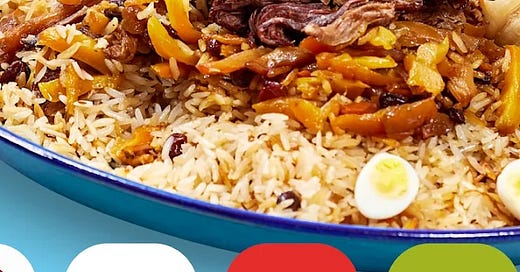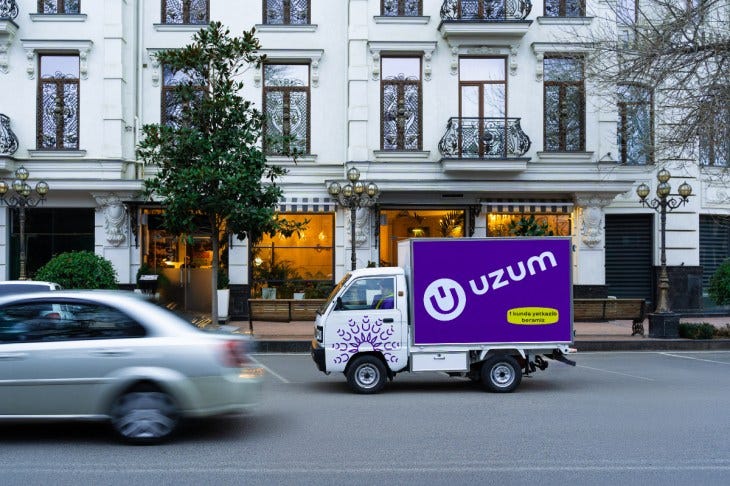Delivering An Uzbek Unicorn
Amazon same-day pharmacy, Instacart Developer Platform, courier-focused restaurants
Wow, what a Wednesday. All the big boys have some sizable updates: Amazon launching same-day RX delivery, Instacart rolling out an impressive API, updates from DoorDash & Uber Eats, and of course the newest big dog you need to know all about: Uzum.
This newsletter will be off for the rest of the week because it, and the rest of the world, will be at Curbivore!
Today:
Amazon Pharmacy Launches Same-Day Delivery in LA, NYC
Instacart Unveils Developer Platform
Chart Time | Serving the Courier
Uzum Is Uzbekistan’s Unique Unicorn
RX | Amazon Launches Same-Day Pharmacy Delivery in LA, NYC
Amazon Pharmacy is launching a new same-day delivery option, now live in NYC and Greater Los Angeles. Amazon plans to further expand the offering by year’s end, which it has already been testing in smaller markets like Austin and Miami. The retail giant will dispatch this new quick service from smaller-format facilities, with a focus on urgent-care items. In the Big Apple, Amazon will transport meds via e-bike, while in SoCal it’ll rely on Rivian electric vans. (And of course, Bezos and Co. also use drones to fulfill Rx orders in humble li’l College Station.) The company also plans to use AI (ooh, aah) to speed up prescription reading and filling.
The Big Picture: Despite being worth hundreds of billions of dollars annually, less than 10% of U.S. prescriptions are filled via delivery. Over the past decade or so pharmacy benefit managers have made a big push to fill scripts by mail, while Walgreens also offers same-day delivery. Uber has its own in-house Rx delivery play via Uber Health, while Instacart and DoorDash have opted to work with CVS and Walgreens. This move will also put pressure on the big grocers, which haven’t made a big push to market delivery from their in-house pharmacies.
We’ll See You at Curbivore, Friday in Downtown LA
What’s left to say at this point? The worlds of delivery, mobility, curb management, civic commerce and tech policy come together Friday for Curbivore 2024.
If you’re slower than a Chick-fil-A drive-thru during the lunch rush, we’ve still got a handful of Friday Only tickets left.
BIZ DEV | Instacart Launches Food Experience API
Instacart just launched its Instacart Developer Platform (IDP), a publicly available API intended to enhance interactive food experiences for third-party partners. This means that brands — including its launch partners New York Times Cooking, WeightWatchers and GE Appliances — can tap into its meal planning, calorie, grocery partner, shopping list and delivery data, to enhance existing food-centric website and applications. Daniel Danker, chief product officer and head of online grocery for Instacart, is particularly excited about functionality like “When I add ingredients from the New York Times recipe to my cart with that button, the special Spanish olive oil that I always buy shows up. You may have a different one and that will show up in yours.” (You might remember Daniel from Curbivore 2020, chatting with us when he was Head of Product at Uber Eats.)
The Big Picture: Echoing Daniel’s thoughts that this is a “goosebumps moment,” we’ve got to say this is a pretty interesting new feature. From a partner standpoint, it really is a rich and feature-filled data set to tap into, sure to make cooking and health apps more robust and useful. That explains the long list of launch partners: Biocoach, DinnerTime, Eatlove, eMeals, Foodsmart, Innit, Intent, Jow, Jupiter, Maple, North Fork, Relish and Smart Commerce. From IC’s perspective this is an amazing way to drive volume to their platform, and ensure someone leafing through an online recipe doesn’t instead fire up a different app (or heaven forbid, head to the store themselves.) The API also ties into Instacart’s existing affiliate program, which offers partners a 3% commission for sales they drive.
CHART TIME | Serving The Courier
DoorDash and Technomic have compiled data on how restaurateurs are trying to make lives easier for the couriers they rely on. Seems like there’s still some very low hanging fruit, given how few merchants report they offer workers somewhere to charge their phones (gosh, those chargers cost a whole five bucks apiece!) The report also have some valuable data on how adding booze to the menu can entice more customers: 39% of consumers surveyed say they’d be likely to purchase alcohol from restaurants if available on third-party platforms and 35% agreed that the availability of alcohol would make them more likely to order from a particular restaurant.
FINANCE | Meet Uzum — Uzbekistan’s Unicorn
Looks like the silk road just got a bit more crowded: meet Uzum, the first unicorn to hail from humble Uzbekistan. Based in the capital city of Tashkent, Uzum just raised $114 million in fresh funding, hitting a lofty $1.16 billion valuation. (That’s roughly 14,633,400,000,000 Som — the local currency.) Funding came from FinSight Ventures and Dubai-based Xanara, with Uzum noting plans to raise another $200M later this year. Uzum is growing quickly, having just launched its marketplace product in October 2022, and hitting $150M of GMV last year. 2023 also marked the launch of “Uzum Tezkor,” its third party food delivery arm.
The Big Picture: Putting this in perspective, Uzum’s valuation is about 1.7% of Uzbekistan’s entire GDP… so imagine if your favorite startup was worth $396 billion after a year and a half of operations. Uzum has big goals to back up that lofty number: it doesn’t want to just be a 3PD, heck it’s not settling to be a mere Uzbek Amazon, it’s hopping to be the super app for the whole country, if not greater Central Asia. In this sense, it’s treading in a path worn by the likes of India’s Flipkart, Indonesia’s GoJek, LatAm’s Rappi, or Kaspi.kz in neighboring Kazakhstan. Besides its food and marketplace delivery arms, Uzum offers banking, BNPL, business solutions and more. As it’s now the country’s most downloaded app, locals might not even know there is an internet outside of Uzum.
A Few Good Links
Portraits of gig worker rest area infrastructure (or lack thereof) the world over. PopWheels hopes to combat NYC ebike fires. Minneapolis wants to spend $150k to fund a new TNC (here’s an idea: spend the money on subsidized bus fares.) Uber adds car seats, touts $200M in healthcare payments post-Prop 22. DoorDash launches restaurant accelerator in D.C. and Minneapolis. Instacart scores Associated Wholesale Grocers partnership. Coffee Bean & Tea Leaf opens first drive-thru. Visa & MasterCard offer merchant fee reprieve. B’more bridge tragedy could snarl supply chains. TJ’s opens grab-and-go store in NYC, dubbed Pronto (TJ’s actually started its life as a convenience store chain called Pronto Markets.) Uber Eats adds Weis Markets. Robert Reich mad at Walmart, news at 11. McDonald’s and Krispy Kreme nationwide expansion will take a whopping year and a half. Bojangles buys from Bikky. Autocar and Rocsys plan hands-free truck charging. Nimbus Kitchens expands to the Windy City. Indigo Tech scores investment from Foxconn to build delivery-oriented EVs. DroneUp plans ecosystem. NYC struggles with curbside charging. Panera Bread suffers systemwide tech outage. MTA board approves congestion pricing.
P.S. Curbivore, Curbivore, Curbivore, Curbivore, Curbivore!
Got a tip, feedback, or just want to say hi? Reply back to this email.









